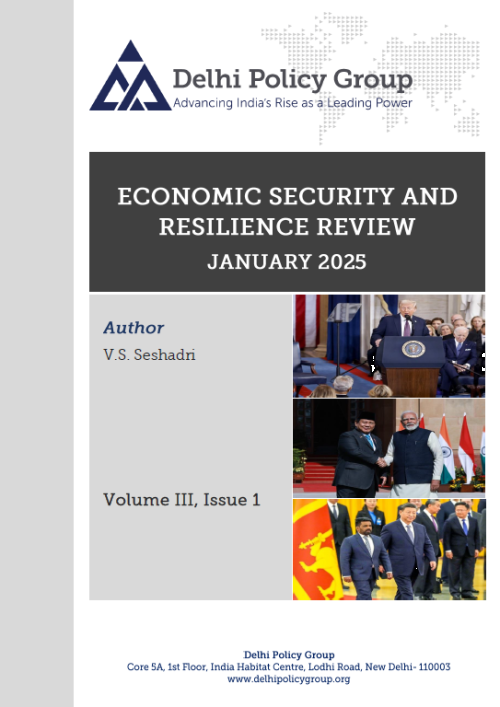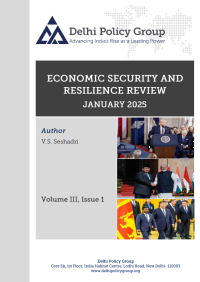Economic Security and Resilience Review
Date: February 05, 2025
As the ESRR enters its third year, it is increasingly clear that the issues covered in this monthly publication are receiving greater global focus at a time of rising geopolitical and geoeconomic contestation.
This issue draws particular focus to the “America First” trade policy enunciated by President Trump, both in his inaugural address and in the several executive orders he issued on his first day in office. His public statements about the use of tariffs as a tool to resolve issues relating to immigration and other non-trade matters, and his continued mention of India as a high tariff country, are issues of concern. They could result in sweeping changes to the global trade and economic security environment, and may also impact India.
President Trump and PM Modi held a phone conversation on January 27, 2025. The call appeared to have been held in a spirit of expanding and deepening cooperation between the two countries. A visit by PM Modi to Washington DC also appears on the cards.
Some of the trade restrictive measures taken by President Biden during his last weeks in office could also affect India. These include the widening of US sanctions against Russian oil and gas exports, and new export restrictions on advanced semiconductor chips that have AI applications.
China has retaliated to some of the restrictive measures imposed in the last several months by the US on semiconductor chips by launching anti-dumping and subsidy investigations against US chip exports.
China is reportedly restraining the export of machinery and movement of its factory personnel to India after seeing the success of iPhone manufacturing in India.
At a time when India-EU FTA negotiations are making slow progress, India’s Minister for Commerce and Industry, Piyush Goyal, and the new EU Commissioner for trade and economic security, Maros Sefcovic, have given fresh political directions to the two negotiating teams.
The Union Cabinet has approved a new National Critical Minerals Mission with an outlay of Rs. 34,300 crores. Also relevant in this context is a joint US-Norway report on critical minerals which tracks the non-market economy policies and practices followed by China that has led to market concentration and vulnerabilities in this sector. The report concludes that without action by market economies, this concentration is likely to grow even further.
This issue of ESRR also reviews the outcomes of the state visit of Indonesian President Prabowo Subianto to India, and the visit of Sri Lankan President Anura Disanayaka to China.
To read this issue of the ESRR, Vol. III, Issue 1, please see the PDF attached
This issue draws particular focus to the “America First” trade policy enunciated by President Trump, both in his inaugural address and in the several executive orders he issued on his first day in office. His public statements about the use of tariffs as a tool to resolve issues relating to immigration and other non-trade matters, and his continued mention of India as a high tariff country, are issues of concern. They could result in sweeping changes to the global trade and economic security environment, and may also impact India.
President Trump and PM Modi held a phone conversation on January 27, 2025. The call appeared to have been held in a spirit of expanding and deepening cooperation between the two countries. A visit by PM Modi to Washington DC also appears on the cards.
Some of the trade restrictive measures taken by President Biden during his last weeks in office could also affect India. These include the widening of US sanctions against Russian oil and gas exports, and new export restrictions on advanced semiconductor chips that have AI applications.
China has retaliated to some of the restrictive measures imposed in the last several months by the US on semiconductor chips by launching anti-dumping and subsidy investigations against US chip exports.
China is reportedly restraining the export of machinery and movement of its factory personnel to India after seeing the success of iPhone manufacturing in India.
At a time when India-EU FTA negotiations are making slow progress, India’s Minister for Commerce and Industry, Piyush Goyal, and the new EU Commissioner for trade and economic security, Maros Sefcovic, have given fresh political directions to the two negotiating teams.
The Union Cabinet has approved a new National Critical Minerals Mission with an outlay of Rs. 34,300 crores. Also relevant in this context is a joint US-Norway report on critical minerals which tracks the non-market economy policies and practices followed by China that has led to market concentration and vulnerabilities in this sector. The report concludes that without action by market economies, this concentration is likely to grow even further.
This issue of ESRR also reviews the outcomes of the state visit of Indonesian President Prabowo Subianto to India, and the visit of Sri Lankan President Anura Disanayaka to China.
To read this issue of the ESRR, Vol. III, Issue 1, please see the PDF attached



